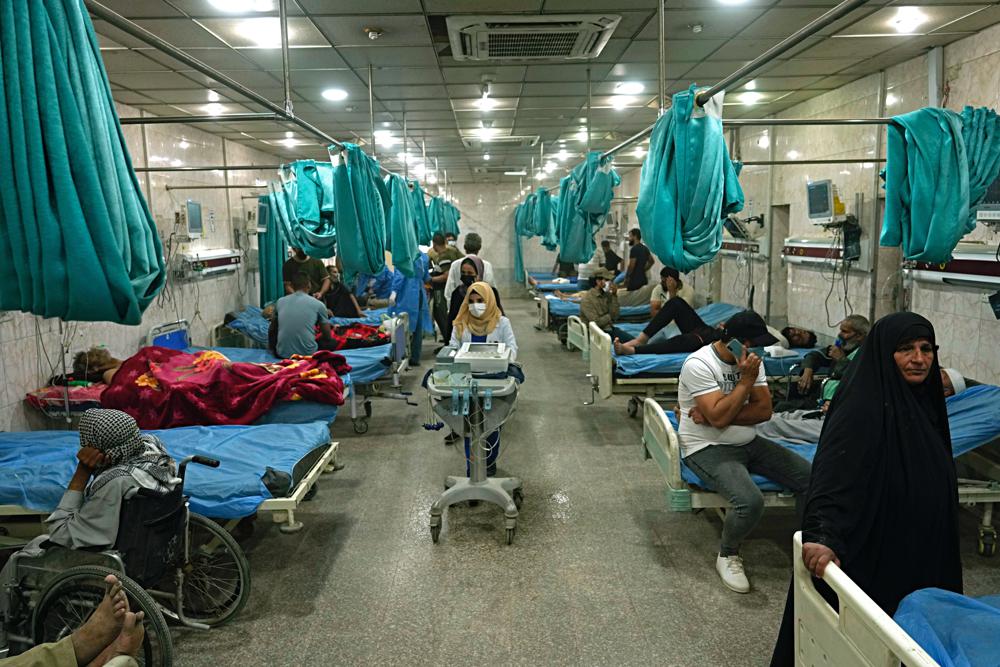ERBIL, Kurdistan Region - Scores of people were hospitalized for breathing difficulties across Iraq and the Kurdistan Region on Monday, as heavy dust storms engulfed several of the country’s provinces, Iraqi state media and officials from the Region reported.
Massive dust storms clouded provinces in Iraq and the Kurdistan Region on Monday, reducing visibility in the areas hit by the storm and leading to difficulties in breathing.
Around four thousand cases of breathing difficulties were recorded across several provinces of Iraq, with Kirkuk, Salahaddin, Wasit, and Basra accounting for almost 1,300 of the hospitalized cases, according to state media.

News circulated earlier on Monday, claiming that a Kurdish child by the name of Murad Abbas had died due to breathing difficulties caused by the dust storm in Kirkuk. The spokesperson for Kirkuk’s health directorate Saman Yaba Ali denied the rumors, telling Rudaw that Abbas had heart problems and that “his death had nothing to do with the dust storm.”
Iraq’s health ministry reported that no individuals had died from the breathing difficulties and that all patients had received sufficient medical treatment.
In the Kurdistan Region, the province of Sulaimani hospitalized nearly 70 people due to breathing difficulties, Saman Latif, Sulaimani’s health directorate spokesperson told Rudaw, adding that most patients have been sent home after receiving treatment.
Hunar Hamid, Rudaw’s reporter in Garmiyan administration, stated that a total of 52 cases of breathing difficulties were recorded in Garmiyan, expecting the number to increase as the storm continues.
Media director of Iraq’s meteorology and seismology directorate, Amer al-Jabri, told Rudaw on Monday that visibility in Baghdad was reduced to around 300 to 400 meters, causing a number of car accidents in the Iraqi capital.
“We predict that the escalation of dust will begin to disappear starting from the evening in the central and northern regions, and its effects will remain until tomorrow on the southern region, but it will gradually disappear,” added Jabri.
Iraq's environment ministry in April said that the number of dusty days in the country has increased from 243 to 272 days per year over the past two decades, and is expected to reach 300 dusty days per year in 2050.
Jabri denied these speculations, stating that “the news is incorrect” and that it was not possible “to expect storms during 300 days throughout the year.”
The provinces of Baghdad, Wasit, Diwaniyah, and Babil declared Monday a public holiday amid the ongoing dust storm. Late Monday night, Basra and Dhi Qar announced Tuesday to be a public holiday in anticipation of similarly poor air conditions.
Iraq’s Ministry of Education announced on Monday evening that they will be postponing Tuesday’s exams to a later date, according to state media.
Experts believe the dust increases as a result of the worsening drought which reduces the flow of water in the Tigris and Euphrates, creating drier land more susceptible to sand storms.
Updated at 11:30 pm with education ministry announcement








Comments
Rudaw moderates all comments submitted on our website. We welcome comments which are relevant to the article and encourage further discussion about the issues that matter to you. We also welcome constructive criticism about Rudaw.
To be approved for publication, however, your comments must meet our community guidelines.
We will not tolerate the following: profanity, threats, personal attacks, vulgarity, abuse (such as sexism, racism, homophobia or xenophobia), or commercial or personal promotion.
Comments that do not meet our guidelines will be rejected. Comments are not edited – they are either approved or rejected.
Post a comment